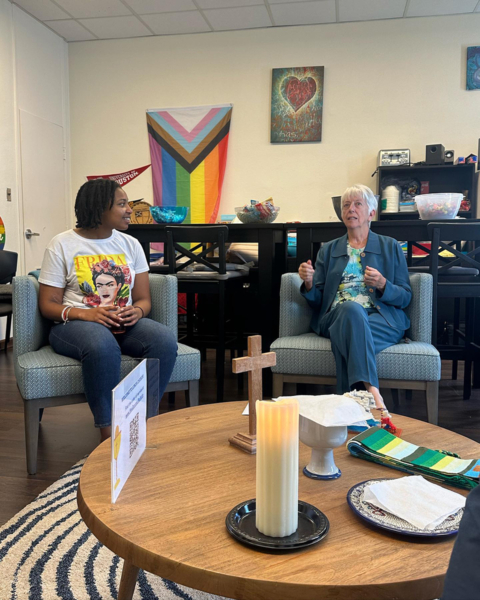After Texas law forces closure of LGBTQ+ center, Houston campus ministries offer space for studentsPosted Nov 1, 2023 |
|

The Rev. Charles Graves, left, sits with Herb Agan, a University of Houston psychology professor, in Houston Canterbury’s suite in the campus’ A.D. Bruce Religion Center. Photo: Houston Canterbury, via Facebook
[Episcopal News Service] Four campus ministries, including one led by an Episcopal priest, have stepped up their outreach to LGBTQ+ students at the University of Houston since Aug. 31, when the public college in Texas’ largest city closed its LGBTQ Resource Center to comply with a new state law.
The law, which was adopted by Texas’ majority-Republican Legislature and signed in June by Gov. Greg Abbott, also a Republican, prohibits public universities from operating departments or facilities that promote programs of diversity, equity and inclusion. The legislation has coincided with efforts in other Republican-controlled states where officials have stoked opposition to diversity initiatives as fuel for culture war battles. Florida adopted a law similar to Texas’ law in May.
In Texas, public universities can still provide support services to students, but schools like the University of Houston are being careful to no longer tailor that support specifically to LGBTQ+ students, women or racial minorities. The University of Houston responded by shuttering both its LGBTQ Resource Center and its Center for Diversity and Inclusion, creating a Center for Student Advocacy and Community instead.
The University of Houston had been the only public campus in the city with a designated LGBTQ+ center, where students had a safe space to support each other, discuss relevant topics and share resources, according to the Rev. Charles Graves, the Episcopal campus missioner at the University of Houston. “We’re in the middle of a state that is very difficult for queer folks, even in a city like Houston, so it was meant to be kind of an oasis for students who didn’t otherwise have one,” said Graves, who is gay. He also leads Houston Canterbury, an Episcopal organization serving all three public universities in the city.
The loss of an official center on campus left a significant gap in support for LGBTQ+ individuals, Graves said. To fill that gap, Houston Canterbury partnered with Lutheran, United Church of Christ and Jewish campus ministries to offer LGBTQ+ student organizations free use of space in the A.D. Bruce Religion Center on campus. The university provides office suites in the facility to numerous faith groups and denominations.
The informal coalition of campus ministries now is in the process of determining the student organizations’ needs and how the ministries can best accommodate them at the religion center.

Houston Canterbury is one of four campus ministries partnering to offer space for LGBTQ+ students to meet after the University of Houston closed its LGBTQ Resource Center. Photo: Houston Canterbury, via Facebook
“As soon as it became clear that the [LGBTQ+] center was going to be closed, we came together and said, how can we fill that space? What can we do?” said Graves, who also is a member of Executive Council, the churchwide governing body.
The missioners and students both acknowledge the arrangement isn’t ideal, particularly because some LGBTQ+ students have felt ostracized in the past by certain Christian denominations that adhere to anti-gay teachings. Compared to the former LGBTQ+ center, “I personally would feel a lot less comfortable [at the religion center],” Alec Minney, a member of the campus student group GLOBAL, told the Houston Chronicle. “Religion just kind of permeates the atmosphere.”
Katie Tolman, a Houston student and president of GLOBAL, was more receptive to the faith groups’ offer of meeting space. Students often “don’t realize y’all are LGBT friendly,” Tolman told the Chronicle, referring to Houston Canterbury and its partner ministries. “It would be awesome to do stuff, however y’all can help.”
In addition to offering meeting space, the faith groups are interested in helping to bring back a series known as “Rainbow Chats,” a popular program featuring conversations on various topics that was offered at the former LGBTQ+ center.
Graves and the other campus ministers also plan to show their support “just by our public witness,” such as by their participation earlier this year at a protest on campus over the closure of the LGBTQ+ center.
Graves said he doesn’t try to speak for the student organizations in those contexts but offers to lend his voice of support, as an openly gay priest, “just to say no matter what religious messages you’ve heard, no matter what other churches have told you … what our faith teaches us is you are loved.”
– David Paulsen is a senior reporter and editor for Episcopal News Service. He can be reached at dpaulsen@episcopalchurch.org.

Social Menu